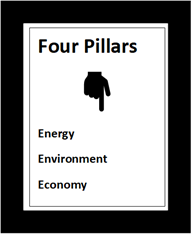Clean Technology
Updated on 2023-08-29T12:00:52.266856Z
Clean Technology (also known as cleantech, green technology and greentech) is a set of technologies based on the concept of environmentally sustainable practices. It emphasizes on reducing pollution and the usage of energy and resources in all the phases of a product’s life cycle. The technology focuses on appropriate measures needed to minimize and eliminate any pollution or waste generated at the production stage. It is a fast-growing domain that has embedded itself in multiple sectors such as energy, consumer, technology, waste management, industrials and so on.
Pillars of Green Technology Policy
The four pillars of cleanteach are:

- Energy: Advocates of this technology aim to attain energy independence and promote efficient utilization of resources. The energy harnessing should be done through eco-friendly methods and reduce waste by-products. The energy generated should also be efficiently consumed.
- Environment: The idea is to conserve and protect the environment. All human activities have an impact on the environment. The environment’s health and situation can also limit our actions. Hence, we should be mindful while using our resources.
- Economy: By using clean or green technology, national economic development can be enhanced. This technology has emerged as a major appealing factor for new businesses and consumers too.
- Social: Improving the quality of life for everyone by raising awareness about social needs via engaging citizens and communities together. Establishing common goals and interests can lead to an effective collaborative action in improving the environment’s health.
Objectives of Employing Clean Technology
Clean technology helps businesses and entities minimize short-term and long-term risks to humans and environment. Increasing public awareness and incorporating cleantech education at grassroots can facilitate the growth of this industry and increase its contribution to the national economy. The focus should shift to making ecologically viable products that can be re-used and are environmentally unsustainable by changing patterns of consumer consumption.
Some of the companies employing green technology are Tesla, First Solar, Climeworks, General Electric, Sierra Energy, etc.
What are the reasons to shift to clean technology?
Introduction of clean technology can also be depicted as another industrial revolution. Since the first industrial revolution in 18th century, our reliance on fossil fuels and natural resources have increased, leaving a negative impact on the world. Looking at the current climate emergency, worldwide governments are adopting regulatory regimes to save the earth.
Is cryptocurrency a clean technology?
A cryptocurrency is an electronic form of exchange to buy goods and services, which uses an online ledger based on blockchain to secure transactions. Crypto mining involves massive energy consumption that leads to high carbon emissions impacting the environment.
Advantages of clean technology
- Global warming slowdown: The usage of green technology acts as a promising solution to global warming. Minimizing the use of environmentally harmful products is important. Introduction of renewable energy such as wind and solar farms, electric cars, etc. is helping reduce the carbon emissions.
- Tax advantages: Globally, governments are introducing various measures to encourage businesses implement cleantech such as tax relief to entities promoting ecologically sustainable activities. Government also encourages eco-friendly business models by providing certain advantages.
- Strengthening brand name: Consumers are conscious about the rising need of sustainable products and services and are willing to pay more for these. Companies can experience rise in profits on increased sales of products and services marketed as ‘green’.
- New business opportunities: Nowadays, consumers are interested in eco-friendly products or companies involved in corporate social responsibility (CSR) activities, encouraging other organizations to change their approach. Such businesses have the potential to become profitable enterprises or attract investment.
Disadvantages of clean technology
- High research: The innovation required in sectoral implementation of clean technology is still in a nascent stage.
- High product development cost: Green products generally come with a higher price tag as compared to traditional products due to the greater cost of sustainable raw materials as opposed to mass-produced chemical-based raw materials. The high product cost results in lower demand.
- Lack of knowledge: Since the beginning of 21st century, scientists have highlighted factors causing to pollution and climate change, such as excessive usage of coal for energy generation. The lack of awareness on the green technologies among underprivileged communities is a major challenge.
Not everything labelled as green is ‘green’.
Going green has become a profitable business strategy for companies, leading to misleading marketing campaigns. The deceptive act of portraying an organization’s products and services as eco-friendly or sustainable is known as greenwashing or green sheen.